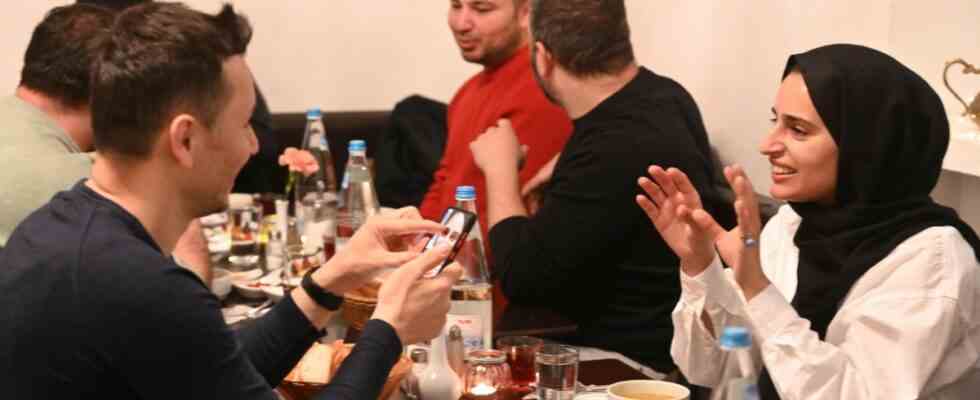The scene is reminiscent of the trip to Jerusalem: everyone remains in their position and waits for the signal so that they can finally continue. In Ahmet Malak’s shop one has to say: that it’s only just getting started. Strike 8:09 p.m., 8:10 p.m., 8:11 p.m., 8:13 p.m. – one or more minutes later every day. Because exactly at the moment when, according to the calendar, the sun goes down, the fast-breaking begins here, in the restaurant “Mama’s Küche” on Hotterstraße.
As soon as the call to prayer “Ezan” has faded away, there is movement in the rows of guests. As the Prophet Mohammed commanded, people first reach for the date, the symbol of purification. “The next thing we always have is soup, which we put in each seat beforehand so that everyone can start at the same time.” With a big smile, the 35-year-old host talks about this spiritual choreography.
Iftar, the breaking of the fast in Ramadan, is a celebration of community. Family, friends, colleagues, neighbors – everyone should come together and end the hardships of the day when they didn’t eat or drink together. “The last two years have been totally terrible,” says Malak, son of Turkish parents. “You couldn’t be together because of the pandemic, I didn’t feel Ramadan at all.” Since the month of fasting began on the evening of April 2 this year, “every day is full for us”. And even busier than before Corona. “You can tell that people were really looking forward to it.”
Chef Ahmet Malak in his kitchen.
(Photo: Stephan Rumpf)
“After these two years, in which we missed the mosque and the community during Ramadan, we realize how great the longing of the believers was for this spirituality, at a time when we were close to both God and our fellow human beings looking for,” says Imam Belmin Mehic. He is on the board of the Munich Forum for Islam (MFI), which has its rooms above “Mama’s kitchen”. “It was a time when we turned our homes into a place of prayer and when services were held within the family circle.” A challenge for the believers as well as for the mosque communities. “Imams had to look for new ways to maintain contact with the community, which led to the switch to online offers.” But also to empty prayer rooms – and thus to empty donation boxes.
For individual communities, says Mehic, the situation was very problematic: “Most of them are dependent on donations, and the lack of them was a financial burden for them.” A Munich house therefore had to close. The members were no longer able to pay the rent. “Others, thank God, made it through this period, they switched to online donations or the members paid a monthly contribution.”
Imam Belmin Mehic is on the board of the Munich Forum for Islam (MFI).
(Photo: private)
The time as a restaurateur was also hard for Malak. “But we also deliver food, and many have accepted that.” Quince stew, aubergine puree, okra stew, stuffed peppers, lentil soup – many people picked up the whole range of oriental-Anatolian home cooking themselves from the counter in the backyard shop. The lemonade made from hibiscus, cinnamon, dandelion and apple, which Malak’s sister-in-law “Mama” Seher prepares like everything else herself, can be tapped from the machine next to the front door.
All of the challenges of Ramadan, says Imam Mehic, also had positive aspects. “You had more time for yourself, your own family, you could experience this spirituality in a personal way and within the family circle, for example, talk about the Koran and prepare the meal together.” There were people who enjoyed this personal dimension of spirituality “because there is a special honesty in it”. And after all, Ramadan is also a time for self-reflection, for self-education.
A pre-pandemic image of the 2019 breaking the fast outdoors.
(Photo: Stephan Rumpf)
The start of the Islamic month of fasting this year coincided with the beginning of the relaxation of the corona virus. Life in the mosques is awakening again. Evening community prayers, Koran circles, breaking the fast, especially for women – Mehic’s list is long. The highlight of Ramadan, which ends on the evening of May 2nd, is the night of destiny, which falls on April 27th this year. It is considered the holiest of all nights in Islam because it is on this night that God is said to have revealed parts of the Koran to the Prophet Mohammed for the first time.
Ahmet Malak is looking forward to the next evening. “The audience is always mixed. Once a priest, an imam and a rabbi sat together, I thought that was really great!” Because “bringing it together” is something of a mission for the 35-year-old, he now wants to try it at the next Iftar. “Yesterday I saw three tables with individuals, which I thought was a pity. So now I want to make a common table for them as an option. We just want people to talk more and feel Ramadan.”

